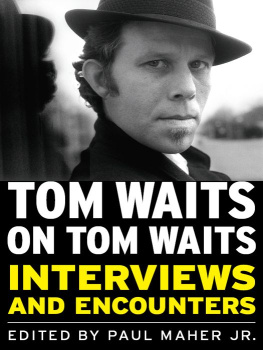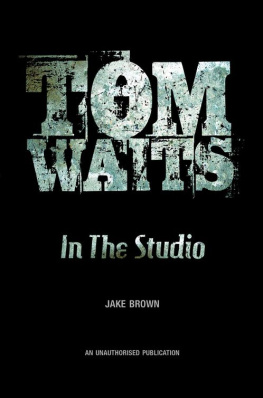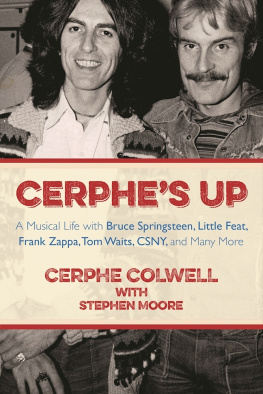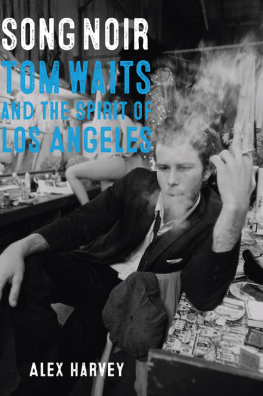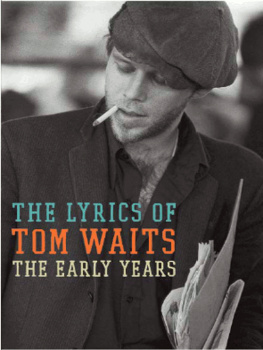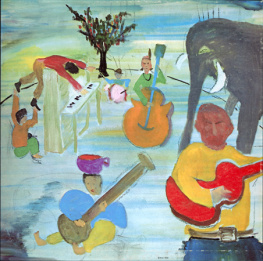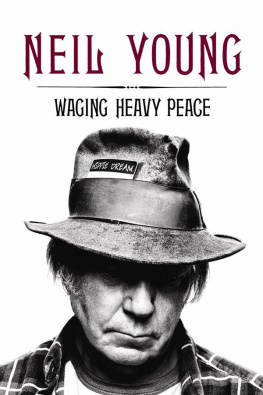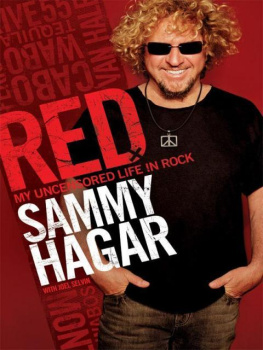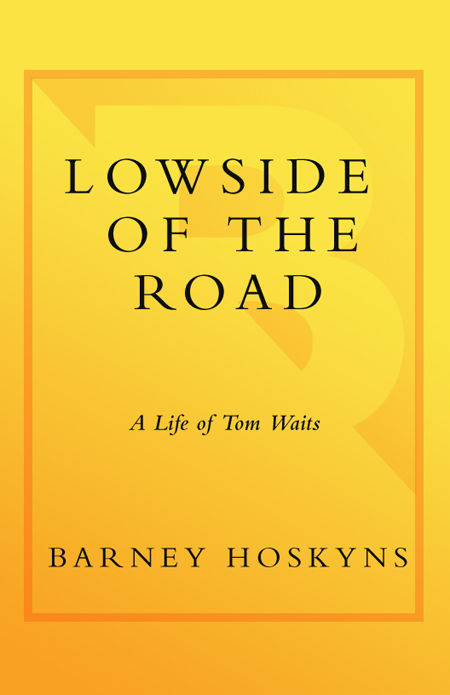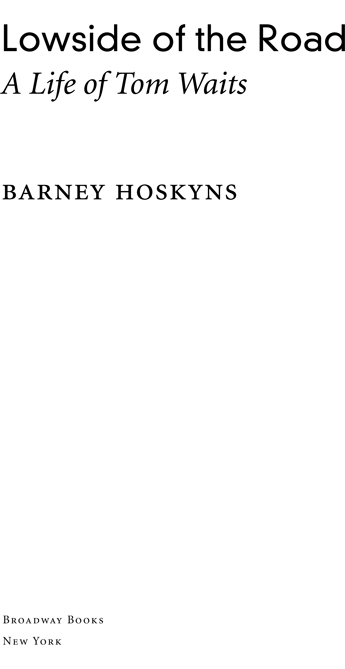For Tom Fry, who turned me on to Captain Beefheartand so much moreat the tender age of twelve. Friends reunited by Brian Wilson after twenty-seven years.
And in fond memory of Rob Partridge.
Prologue
The Only Thing Worse than Being Misunderstood
I do believe in the mysteries of things, about myself and the
things I see. I enjoy being puzzled and arriving at my own
incorrect conclusions.
(Tom Waits to Mark Rowland, Musician, October 1987)
I m guessing the woman was a Jewish-American Princess, though Ive no idea how cold she was on her honeymoon. She certainly had a frosty look on her face as she did an about-turn and marched back towards me. Maybe not frosty, exactly; more plain scared. For shed just let slip that Tom Waits had declined the chance to top one of the bills at Californias Coachella Festival. The little nugget had popped out and, as she trotted away, it dawned on her what shed done.
Hey, she said in a palpably anxious voice as she returned, a clammy palm placed on my forearm. Dont get me in trouble with that Coachella story, you hear?
I beg your pardon? Youd think shed whispered that Waits was cheating on his wife, not that hed turned down the organizers of a frigging rock festival. What did it matter if people knew? To her, apparently, it mattered a lot. The mild panic on the womans face told me something of what I was up against simply in attempting to write a book about Tom Waits.
A few weeks later, Keith Richards sent word from on high that he was happy to talk about working with Waits on Rain Dogs and Bone Machine. But the offer was summarily withdrawn because Tomor more accurately, Tom and Kathleen (Brennan, Waits wife)had been apprised of my request. The apparent perversity of not wishing one of rocks undisputed greats to go on the record with his love and admiration confounded me. It also got me thinking about the Waitses real agenda in stymieing biographers past, present, and future.
At various points during two years of researching Waits life and work I had to stop and ask myself, Do I actually have the right to write a book about Tom Waits? Its tough not to personalize the rebuffs, not just from the Waits camp but from certain acquaintances and collaborators. Tough, too, not to see their polite requests that such people not consort with me as covert censorship.
What do you think theyre afraid of? friends asked me. Generally what I said was something like: I dont know what theyre afraid of. I think they know Im not Kitty Kelley or Albert Goldman or J. Randy Taraborrellior Nick Broomfield or A. J. Weberman or Rupert Pupkin. Theres not a lot of dirt to dig up anyway. So Waits got loaded with Rickie Lee Jones and Chuck E. Weiss. So they defaced lawn jockeys in Bel Air and got into a spat with some cops at Dukes coffee shop. So what. Usually I paused before adding: Actually I dont think theyre afraid of anything. They just dont want a book out there that, in some cod-Freudian, ad hominem way, reduces Waits to the sum of his life experiences. And I have some sympathy with that; in fact, I have total respect for such a stance.
My friend Jeb Loy Nichols reminded me of how the artist Joseph Cornell (one of Waits minor heroes) resisted all attempts at investigation of his life. For the eccentric Cornellsubject of Deborah Solomons biography Utopia Parkwaythe only thing worse than being misunderstood was being understood. And as Bob Dylanone of Waits major heroesonce said, Whats so bad about being misunderstood?
For decades Waits has played an elaborate game with the media, hiding behind the persona he projects. To the question Will the real Tom Waits please stand up? there is no real answer. Tom Waits is as much a character created for his fans as it is a real man behind the closed doors of family life. Am I Frank Sinatra or am I Jimi Hendrix? he said when I asked him if his persona had ever merged with his actual personality. Or am I Jimi Sinatra? Its a ventriloquist act, everybody does one.
But, I countered, some artists are more honest about it being an act than others. We arent supposed to think Neil Young is doing an act. I dont know if honesty is an issue in show business, Waits retorted. People dont care whether youre telling the truth or not, they just want to be told something they dont already know. Make me laugh or make me cry, it doesnt matter. If youre watching a really bad movie and somebody turns to you and says, You know, this is a true story, does it improve the film in any way? Not really. Its still a bad movie.
Reading this quote again, I think that Waits a) should be right but b) is being disingenuous. He knows full well that fans and critics alike experience rock music as, in some sense, communing with an artists soul. Robert Christgau, dean of rock critics, called this the idea that the artists persona is their fundamental creation. Put another way, fans of auteur-artists such as Bob Dylan and Neil Young have long sought to establish a correspondence between their life and their work. Heritage rock mags are predicated on rooting out the stories behind albums such as Blood on the Tracks or Tonights the Night. Theres an inordinate amount of investment in the notion of the artist as suffering seer or tortured poet.
I spend my entire time trying to explain to people that Im a creative writer, P. J. Harveya hardcore Waits fantold me. People jump to conclusions, and I can understand it, because if Im very interested in an artistwhether its Neil Young, Bob Dylan, whoeverI want to imagine that those stories are true. But I think also that when I listen to those writers I project my own stories into their songs. And Id like people to be able to do that with mine.
Dylan and Young, of course, wrote the book on messing with the preconceptions of fans and criticsof not being the Bob Dylan or Neil Young that people want them to be. Not for nothing was Dylan the first singer-songwriter model for the young Tom Waits starting out in San Diego.
The games Waits plays with interviewers thwart all attempts to marry his music to his life: like Prince, an artist he loves, hes too protean to be so easily captured. Moreover, in our age of mass celebrity he refuses to sell himself as a rehab car-crash fuckup. Hes the anti-star who declines to live according to the narrative of sin and redemption that celebrity culture requires. All of which puts a biographer in the invidious position of feeling like a parasite feeding on a resentful host. (In 1999, after years of following his career and writing at length about him, I finally had the opportunity to interview Prince. Is it truth or is it conjecture? he asked me about


